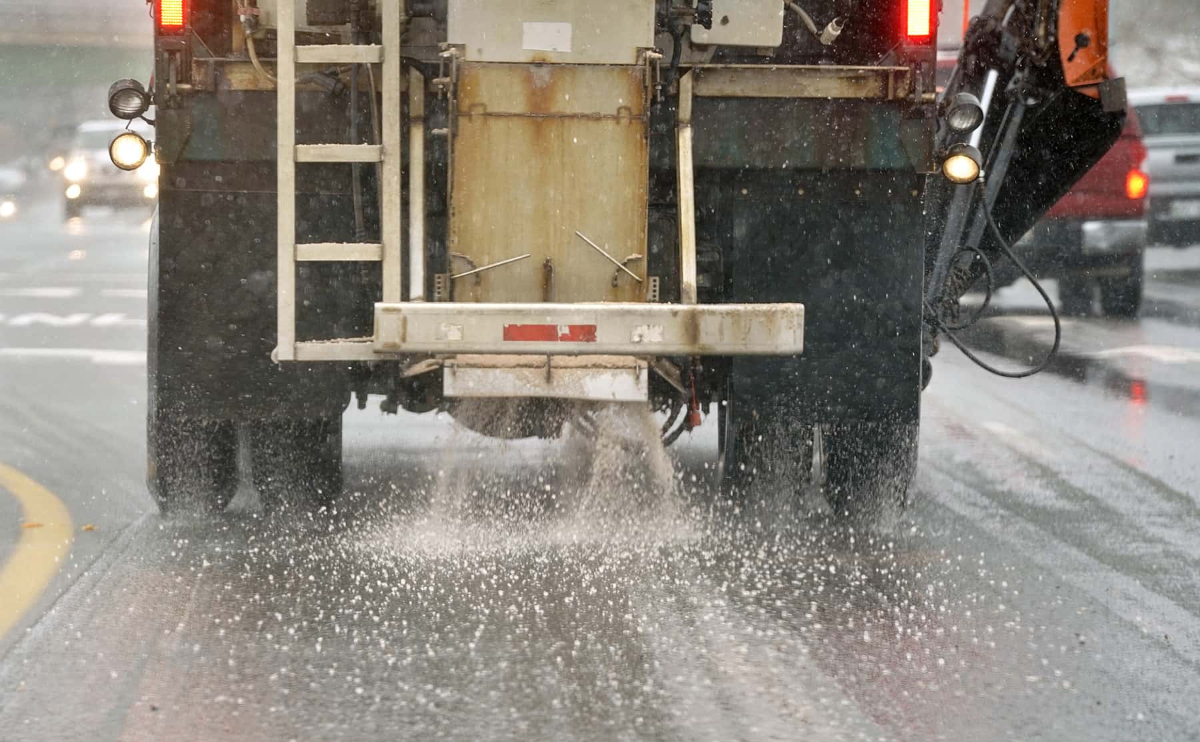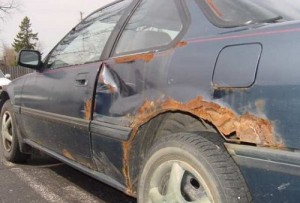Rustproofing Has to Keep Up with Deicing Advances

Vehicle undercoating services are more important today than ever before due to the proactive use of Road brine

When it comes to rustproofing, New Hampshire drivers have to keep up with the times – or risk losing their vehicles to rust. Due to changes in deicing chemicals, the old solution of just washing the salt off may not work anymore. We’ve all seen the signs in front of the car washes: “Salt eat cars.” But while it’s true that salt eats cars, it’s not necessarily true that washing our vehicles will solve the problem. Washing them is still a good idea, of course, but it’s no longer enough. For one thing, there’s more than one kind of substance called “salt.”
Rust Proofing has never been more important because of the introduction to salt brine on the roads. The use of brines is known as anti-icing or pre-wetting measures. Brines have the same melting characteristics of solid rock salt, but since it is applied in liquid form, the salt can begin to work immediately. The brines are also more effective in lower temperatures.
That corrosive white stuff sticking to your car may not be the same kind of salt that’s sitting in a shaker on your kitchen table. While table salt is sodium chloride, some deicing mixes include magnesium chloride. Magnesium chloride is even worse for your car because it eats more than just metal. It can degrade plastic and rubber, as well, which isn’t exactly good news for the insulation on your car’s wiring. Brine is another problem. Brine is salt dissolved in water, and sometimes road crews will spread it on the roads before a storm as a proactive measure. It’s also sometimes sprayed onto the deicing mix to keep the salt crystals from bouncing out of place. These are both great treatments for reducing the danger of ice on the roads. But they also make washing your vehicle less effective. When brine splashes up into your vehicle’s undercarriage, it sticks better than salt crystals. It also seeps into tiny crevices that car washes can miss. But the biggest culprit of all is binding agents, which are included in many deicing mixes to keep the salt sticking to the road even after a snowmelt event or a rainstorm.
These chemicals can be harmless by themselves (even highly nutritious, in the case of beet juice), but the effect on your vehicle is just the opposite. Unfortunately, binding agents can’t be instructed when to stick and when to let go. They can keep the salt sticking to your car even after it’s washed. But rustproofing technology is also changing. The Canadian Automobile Association (CAA) looked at a number of rustproofing methods and chose oil undercoating to recommend to its members. The CAA’s Technical Advisor, Paul Datskiw, put it this way: “We would agree that an oil-based product should be applied every year for maximum protection.” (“Pat Foran’s Tips on Rustproofing Your Car” on CTVNews.com)
NH Oil Undercoating® Advanced Rust Protection See the difference for yourself!
Rust Proofing has never been more important because of the introduction to salt brine on the roads. The use of brins is known as anti-icing or pre-wetting measures.
Brines have the same melting characteristics of solid rock salt, but since it is applied in liquid form, the salt can begin to work immediately. The brines are also more effective in lower temperatures.
You need to be proactive with corrosion because Anti-icing is currently recognized as a pro-active approach to winter driver safety by most transportation agencies. Pre-wetting [using salt brines] has been shown to increase both the performance of solid chemicals and abrasives, as well as their longevity on the roadway surface, thereby reducing the number of materials required,
Be Proactive with Rust Prevention
Vehicle undercoating services / Rustproofing is more important today than ever before due to the proactive use of Road brine
All our specialized products will protect your vehicle against damage caused by salt, liquid de-icing and winter driving conditions. They are designed to penetrate the seams and crevices. It eliminates moisture. It actually eliminates/removes oxygen and moisture from the surface and stops rust and corrosion in all metals while present. It protects vinyl and plastic surfaces from UV rays and improves the function of moving parts through lubrication. Our environmentally friendly products contain no solvents and detergents Stop by today for an evaluation!

 Buy US Direct
Buy US Direct Buy CA Direct
Buy CA Direct Buy EU Direct
Buy EU Direct Buy DE Direct
Buy DE Direct